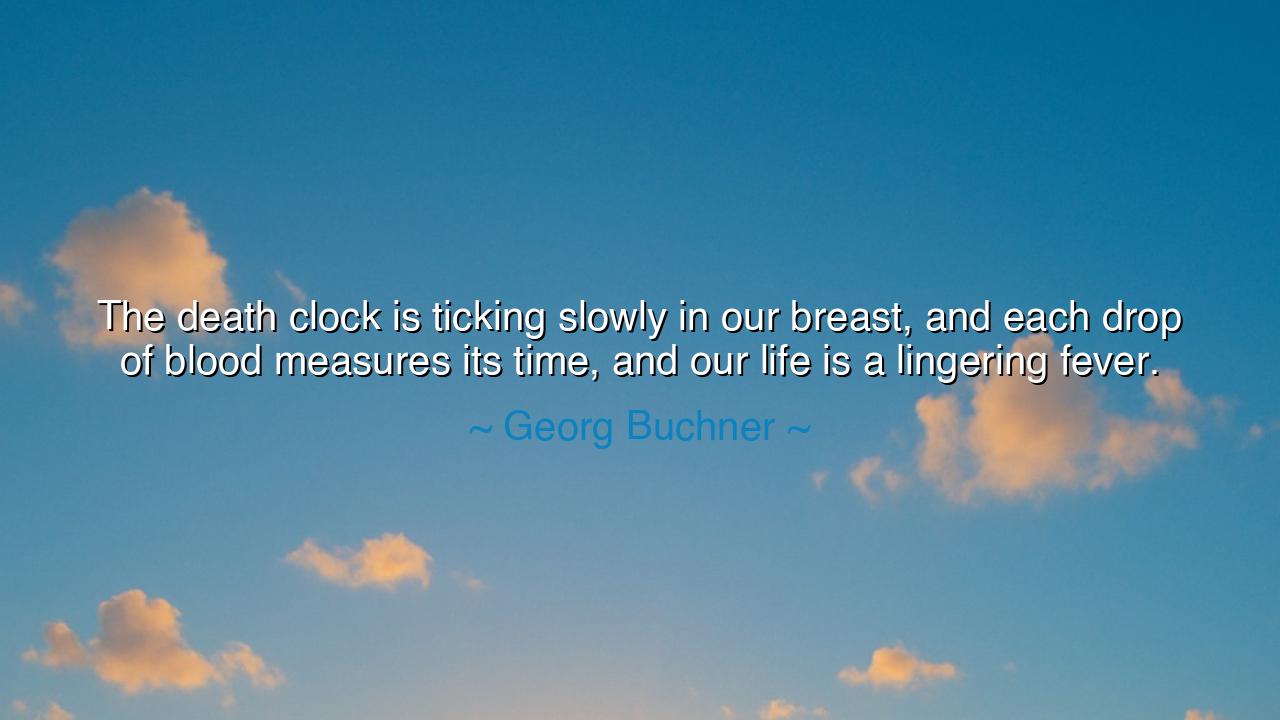
The death clock is ticking slowly in our breast, and each drop of
The death clock is ticking slowly in our breast, and each drop of blood measures its time, and our life is a lingering fever.






In the somber and poetic words of Georg Büchner, the brilliant yet tormented playwright and philosopher, there beats a truth that chills and enlightens in equal measure: “The death clock is ticking slowly in our breast, and each drop of blood measures its time, and our life is a lingering fever.” These are not the words of despair, but of awareness—the voice of one who has looked deeply into the mystery of human existence and seen that life and death are not separate forces, but one continuous pulse. Büchner’s words remind us that mortality is not a distant shadow waiting at the end—it is the very rhythm of our being, ticking quietly within us from the moment we draw our first breath.
This quote arises from Büchner’s profound reflections on the human condition, born from his short yet incandescent life. Dying at the age of twenty-three, he understood better than most how fragile and fevered our days truly are. Living amid political unrest and personal suffering in nineteenth-century Europe, he saw how the passions and struggles of humanity burned brightly but briefly—each life a candle flickering against the vast night. His phrase, “the death clock is ticking slowly in our breast,” transforms mortality from a concept into a physical presence. It beats with our heart, it flows with our blood, it is the unseen companion of every joy and sorrow. Life, he tells us, is not a steady state of being—it is a lingering fever, beautiful yet consuming, an illness from which only death can release us.
Yet within this imagery lies not despair, but a strange and sacred clarity. The ancients, too, taught that to live is to die a little each day. The Stoic philosopher Marcus Aurelius wrote, “You could leave life right now. Let that determine what you do and say and think.” Büchner’s “death clock” is this same reminder: that awareness of mortality should not paralyze us with fear, but awaken us to urgency—to live more fully, to love more deeply, to waste no moment in vanity or hate. When we realize that our blood is also our hourglass, every heartbeat becomes precious, every breath an act of grace.
Consider the life of Anne Frank, whose diary, written under the weight of impending death, shines with unbroken hope. Trapped in hiding, she too must have felt the ticking of Büchner’s invisible clock. Yet she wrote not of despair, but of the beauty of sunlight, the laughter of her companions, and her belief in the goodness of people. Her life, though short, became vast in meaning because she lived it with awareness of its fragility. She, like Büchner, understood that the fever of life is not a curse but a flame—a divine fire that burns even brighter when we know it will one day fade.
To say that life is a “lingering fever” is also to acknowledge its passion—its heat, its turbulence, its restlessness. It is the fever of creation, of yearning, of striving toward something beyond ourselves. The same fever that weakens the body can awaken the soul. It drives the artist to paint, the thinker to seek truth, the lover to risk heartbreak. It is the force that keeps humanity from stagnation, even as it brings us closer to our end. Büchner’s genius lies in his recognition that life’s suffering and vitality are intertwined—that we cannot have one without the other. The fever burns, yes, but it also illuminates.
Thus, when Büchner speaks of the death clock, he is not urging us to dread its ticking, but to listen to it—to let its rhythm remind us that our time is finite, and therefore infinitely valuable. The wise do not flee from this truth; they befriend it. For when one lives in awareness of mortality, each moment becomes sacred, each act meaningful. The small kindness, the honest word, the creative spark—these become our defiance against the slow march of time. To live well is not to escape death, but to ensure that when it comes, it finds us alive, fully and fiercely.
So, my child of tomorrow, let this be your lesson: do not fear the ticking within your chest. It is not a countdown to your doom, but a reminder that you are alive, that the blood flowing through your veins is both your limit and your gift. Feel the fever of existence and let it move you toward greatness. Do not waste your days in hesitation or bitterness; instead, live as though every drop of blood carries the message of eternity.
For in the end, as Georg Büchner teaches, it is not death that defines us, but how we live in its shadow. The clock will one day stop, yes—but until it does, let your heart beat with purpose, your hands labor with love, and your soul burn with the beautiful fever of life.






AAdministratorAdministrator
Welcome, honored guests. Please leave a comment, we will respond soon